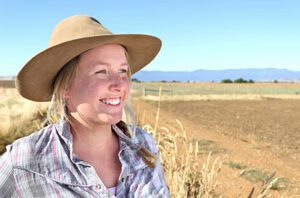News about Farm Bill deliberations can feel wonky and distant, but the debates and decisions lawmakers are making right now on Capitol Hill matter — a lot.
The House is voting this week on the Farm Bill. Today, they are debating amendments that have made it through the first round. Your representative needs to know that you support key conservation programs, including coordinated federal action on the dramatic honey bee declines reported by beekeepers across the country. Please pick up the phone and call today — you'll find talking points and a phone number below. It's easy, and it will make a difference.
This big national policy package we call the Farm Bill gets renegotiated about every five years. This time we have an opportunity to start the long, important shift toward a farming system that provides incentives for farmers, from small to large, to grow a diversity of healthy food crops while protecting the essential soil, water and pollinator resources upon which we and all future generations depend.
Or large-scale, destructive, polluting agriculture could continue to reign. Again, these negotiations really do matter.
A few weeks ago the Senate passed its version of the Farm Bill – and while many key provisions didn't make it through negotiations, we did made some progress. We all need to call our representatives today to make sure this hard-won progress isn't lost on the House side.
What kind of farming?
As this blog goes to press more than 100 amendments have been approved for discussion and vote on the House floor. Many of our favorite provisions didn't make the cut; among those that did are two we strongly support, and one we oppose.
Here are two we're supporting:
- Fortenberry-Thompson, Conservation Compliance (#28) – Reps. Jeff Fortenberry (R-NE) and Mike Thompson (D-CA) sponsored this amendment that's identical to the conservation compliance amendment in the Senate bill. It re-links crop insurance premiums with requirements to protect highly erodible lands and wetlands — a very good idea.
- Hastings, Pollinator Protection (#129) – This amendment from Rep. Alcee Hastings (D-FL) improves federal coordination in addressing the documented decline of managed and native pollinators, and promotes the long-term viability of honey bees, wild bees, and other beneficial insects in agriculture.
Here's one we oppose:
- McClintock, (#92) – This amendment would eliminate the $20 million Farmers Market Promotion Program. Though Rep. Tom McClintock (R-CA) calls the program “duplicative” and unnecessary, last year it supported vibrant farmers' markets around the country, supporting access to fresh produce and building local food economies.
Click here to find your representative. To make your call, dial the House switchboard at (202) 225-3121; an operator will connect you to any office. Here's a script you can use — or put your message in your own voice!
“Hello, my name is ___ and I’m a constituent and a voter (and tell them if you’re a farmer!). I would like to leave a message for Representative ___’s agriculture staffer. Can you take a message for me, please?
The message is: I urge the Representative to support two key amendments during floor debate this week: Fortenberry #28 for conservation compliance and Hastings #129 addressing pollinator decline. I also urge the Representative to oppose McClintock #92 that would eliminate important support of farmers market programs.
Congress needs to get our farm policy back on track by reforming subsidies and investing in a more sustainable future. Thank you.”
Please join me in calling your representative today — it’s easy, and important. Urge them to support the kind of agriculture that makes fiscal sense, protects the environment and helps build and maintain vibrant rural communities throughout the country.
Hopefully you talk to a real person and register your opinion with your representative. That’s how it really does work. And if enough of us call, they really do listen.








